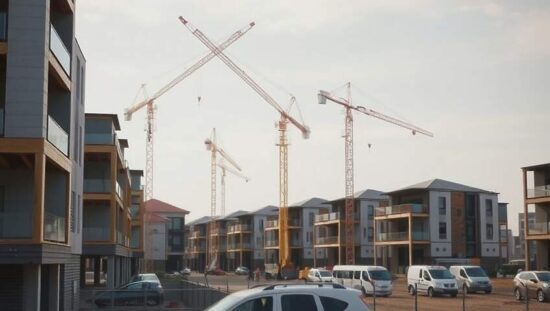Instone, a publicly traded project developer, is signaling a significant shift in the German real estate market with renewed investment in residential construction following years of crisis. The company’s most ambitious undertaking to date centers on the Benrather Gärten in Düsseldorf, a sprawling 15-hectare site acquired from the financially struggling Adler Group.
According to an interview with CEO Kruno Crepulja published in the Handelsblatt, Instone envisions a development of 800 to 1,000 apartments targeted at the middle class, with a total project value estimated between €450 and €500 million. This acquisition is part of a series of recent property purchases, collectively indicating a bullish outlook on the German housing market. Instone also highlighted forthcoming projects in Nuremberg (160 condominiums) and Leipzig (162 apartments), solidifying their expansion strategy.
Crepulja attributed the renewed investor interest to a confluence of factors, particularly the perceived stabilization of the market and a surge in demand from capital investors exceeding levels previously seen during the height of the pre-crisis real estate boom. Crucially, he underscored the role of the 2024 Growth Opportunities Act, citing the act’s “very, very attractive” tax depreciation opportunities for investors. This legislative framework, allowing for substantial tax savings, is effectively incentivizing substantial capital inflow into the sector, presenting what Crepulja characterizes as a uniquely advantageous investment climate, particularly for high-income earners.
Instone is also claiming a competitive advantage in construction costs. The company asserts its ability to build, depending on location, at a cost of approximately €3,500 to €4,000 per square meter, including land acquisition. Furthermore, it claims its pure construction costs at €3,000 per square meter adheres to the stringent QNG-40 standard – a metric for quality and sustainability in German construction.
However, the situation raises critical questions regarding the sustainability of this market rebound. The reliance on tax incentives to drive investment is inherently susceptible to policy changes, potentially destabilizing the market. Moreover, the competitive cost advantages claimed by Instone, while impressive, demand closer scrutiny regarding resource pricing and the potential for upward pressures as demand intensifies. The acquisition from financially distressed entities like Adler Group also prompts concerns about the long-term viability of the projects and the potential for social and economic consequences if the market corrects. The swift return to aggressive development, fueled by advantageous tax legislation, warrants careful monitoring to ensure responsible and sustainable growth in the German housing sector.





